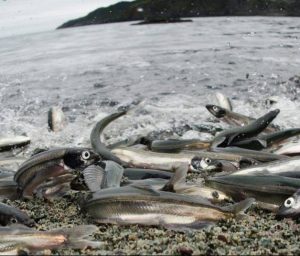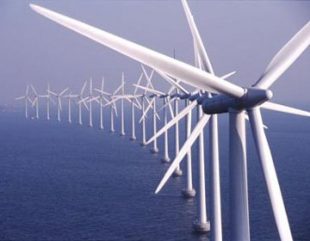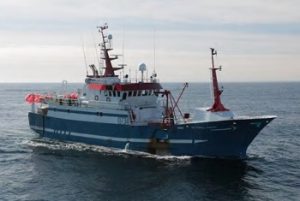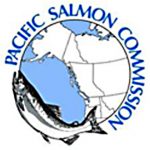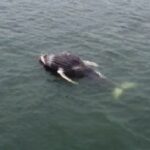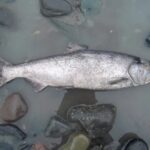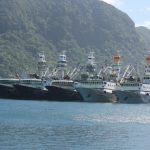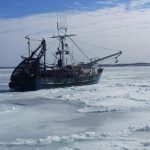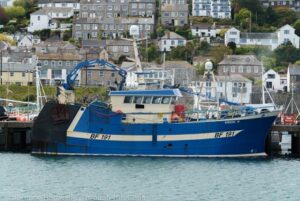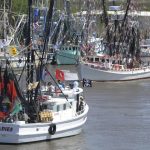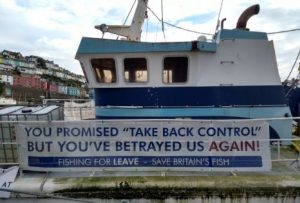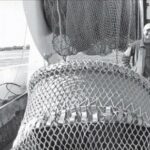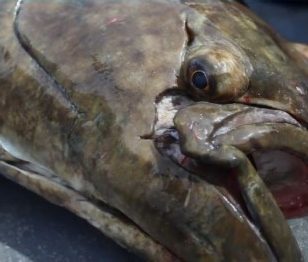Monthly Archives: April 2018
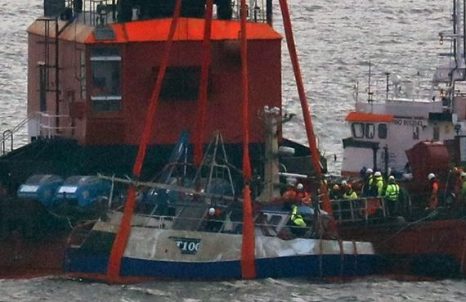
Human remains have been found on the Nancy Glen after it was raised from Loch Fyne.
The boat sank near Tarbert in January with the loss of two crew members. It was brought to the surface by a lifting barge after the Scottish government stepped in to pay for the operation. The bodies of Duncan MacDougall, 46, and Przemek Krawczyk, 38, are believed to be inside the wreck. A third crewman, John Millar, was rescued. A Crown Office spokesman said: “Work has been ongoing overnight and today to raise and secure the Nancy Glen. “Salvage teams who have been on board the vessel have described finding human remains. >click to read< 13:35
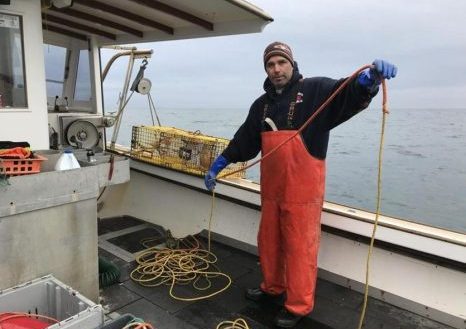
Can anyone save the North Atlantic right whale? A group of South Shore lobstermen say they know what the answer is
By the time Mike Lane shoves off the Cohasset docks, it’s past 8 a.m. — practically lunch time for a lobsterman. But it’s early spring, and the South Shore fisheries are mostly closed, so Lane is keeping a somewhat relaxed schedule. Lobsters tend to hole up for the season several miles farther offshore, and Lane would like to be there, fishing his 800 traps. That area also happens to be a feeding area for North Atlantic right whales — one of our planet’s most endangered species. And so, four years ago, the federal government closed these grounds for much of the winter and spring. That means all Lane can do right now is set a few traps in a small area just outside Cohasset Harbor. >click to read<11:37
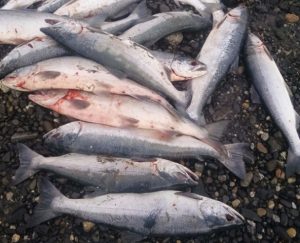
Deadly success?
Twenty-eight years ago, the state of Alaska banned fish farming in favor of salmon ranching. The idea was simple: Catch a bunch of fish, squeeze out their eggs and sperm, mix the two together, hatch the eggs, raise the little fish in a hatchery, dump them in the ocean, wait for them to come back, and net the money. What could possibly go wrong? Maybe this: From 1985 to 1994, before the hatchery program seriously geared up in the Prince William Sound, the commercial catch of sockeye (red) salmon in Cook Inlet averaged about 5.3 million fish per year.>click to read<10:34
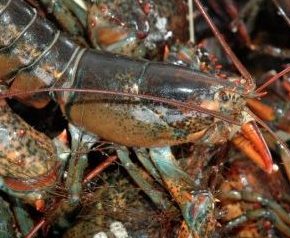
Lou Boudreu – The brave souls who bring you lobster
There is a good eight-foot sea running and 35-knot winds off the port bow. She’s taking a beating, but her classic Cape Island hull handles it. I’m standing exposed on the after deck with two other men handling gear. Another eight-foot sea breaks, blowing the icy cold Atlantic spray into my face. It hurts, but I am long past that stage. I am numb. As I handle the line, putting it around the spool to the pot hauler, my hand gets caught and cut right through the thick glove. But my hand is numb. I’ve gone long beyond the hurt stage;,, >click to read<07:55
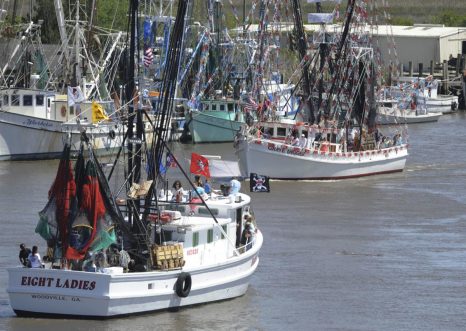
Generations to gather for 50th Darien Blessing of the Fleet
Fred Todd was 10 in 1973 when he went to North Carolina with his father, Bobby Todd, to pick up a new shrimp boat, the Sundown. Sunday afternoon, he’ll be aboard the Sundown as grand marshal for Darien’s 50th annual Blessing of the Fleet when the 60-foot boat sails up the Darien River to the U.S. Highway 17 bridge for a sprinkling of holy water and a benediction for full nets and safe passages. He got aboard the Sundown as a worker in 1981 after finishing school. The Sundown will be one of at least 18 commercial fishing boats in the blessing,,, >click to read<01:30
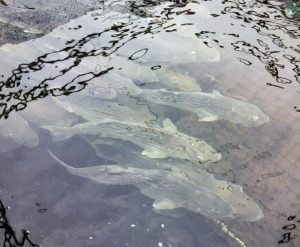
Striped bass population triples in Gulf of St. Lawrence
The remarkable recovery of striped bass in the southern Gulf of St. Lawrence reached unprecedented levels in 2017, according to the latest assessment from the federal Department of Fisheries and Oceans. Department scientists say the spawning population tripled between 2016 and 2017 and is now estimated at one million fish — a 100-fold increase from the 1990s. In addition to the population rebound, tagged striped bass from the Gulf were recovered from Rimouski, Que., north to Labrador for the first time in 2017. In the Forteau Bay area of Labrador, catches of tens of thousands were reported. >click to read<18:50
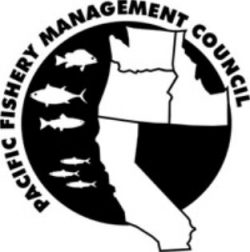
PFMC Sets West Coast Salmon Season Dates
This week the Pacific Fishery Management Council adopted ocean salmon season recommendations that provide recreational and commercial opportunities for most of the Pacific coast, and achieve conservation goals for the numerous individual salmon stocks on the West Coast. The recommendation will be forwarded to the National Marine Fisheries Service for approval by May 1, 2018. “It has been another challenging year for the Council, its advisors, fishery stakeholders and the public as we strive to balance fishing opportunities with the conservation needs we are facing on Chinook and coho salmon stocks, both north and south of Cape Falcon,” said Council Executive Director Chuck Tracy. >click to read<17:52
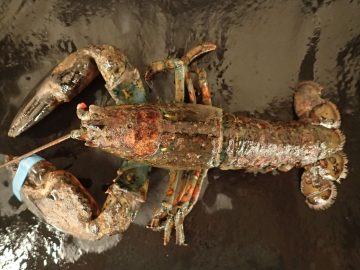
Lobster shell disease nudges up slightly off of Maine
A disease that disfigures lobsters has ticked up slightly in Maine in the last couple of years, but authorities and scientists say it’s not time to sound the alarm. The disease, often called epizootic shell disease, is a bacterial infection that makes lobsters impossible to sell as food, eating away at their shells and sometimes killing them. The Maine Department of Marine Resources said researchers found the disease in about 1 percent of lobsters last year. >click to read<16:41
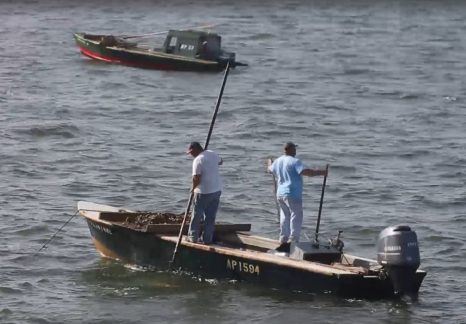
SHELL GAME
Saving Florida’s oysters is a shell game. The right answer is under three domes. Try to follow while the cups whizz by, shifting, swirling. Shell 1: An empty oyster bay. Unemployment. Poverty. But also history. Culture. Shell 2: A slick farming industry that could render the Florida oysterman finally, permanently extinct. Shell 3: The government, doling out money and regulations that might do more harm than good. In a place where everybody’s livelihood is yoked to the water, you have to follow the shells. T.J. Ward was born the year after his grandfather had the throat cancer surgery. T.J. never heard his natural voice. The seaman’s single clap would cut through the salt air on the docks of Apalachicola louder than words could. >click to read<15:00
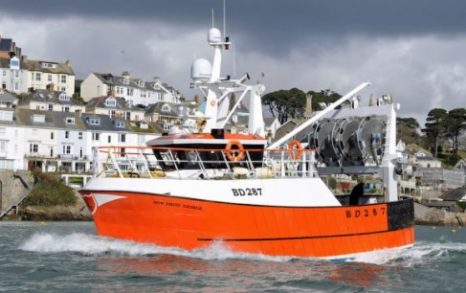
C Toms delivers Our David George
A new twin-rig trawler has been delivered by the C. Toms & Son yard to fishing company North Devon Trawlers, a joint venture between fisherman Scott Wharton and Barnstaple processor Coombe Fisheries. Our David George is designed to alternate twin-rig trawling and scalloping, with capacity to switch over in only a few hours, reports Phil Lockley. The alloy shelter deck can be unbolted and removed within two hours, providing access to the goose-neck to take the derricks. This makes it possible to switch between twin-rigging one day and beam,,, >click to read<13:19

Athearn Marine Agency Boat of the Week: 45′ Stanley Scalloper with permits, 6 Cylinder Iveco 8210, 8 KW Lister
Specifications, information and 28 photos >click here< To see all the boats in this series, >Click here<12:13
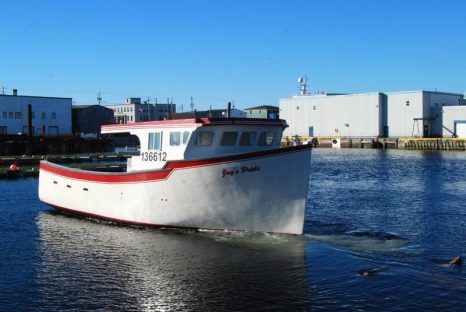
Grand Bank fisherman launches rebuilt boat
Grand Bank’s Jason Matthews, unlike most Fortune Bay fishers, didn’t get much of a break this past winter. Once the 2017 fishing season wound down in late October, he pulled his 40-ft. Cape Island boat out of the water and immediately started to rebuild the craft to a design much more to his liking. For five months he had his “nose to the grindstone” changing the vessel completely. With the help of a couple of friends he cut one foot off the length of the vessel and changed the deck from a “drop deck” to an entirely flat one,,, >click to read<11:18
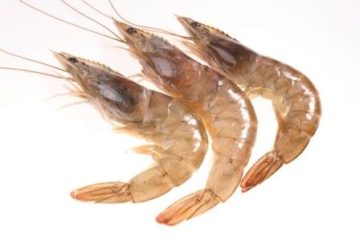
Bayou Region Shrimpers hope blessings are on the way
A blessing of boats in Chauvin Sunday marked the continuation of a sacred tradition in the Bayou Region, as anticipation grows for word that the fleets of various communities can move out onto the water and lower their nets. If preliminary estimates continue on their course, that could happen sooner than later. Biologists for the Louisiana Department of Wildlife and Fisheries reported at a meeting last week that early tests show the potential for a sizeable crop this year. >click to read<10:18
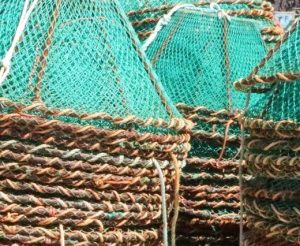
Dispute between Newfoundland and Labrador at-sea observer, fisherman goes to court
Frustrations within the inshore fishery do not always play out in public protests or in front of the media — some disputes take place on the wharf and, when serious enough, can end up in court.
A recent case out of provincial court in Corner Brook involved a dispute on the wharf between an inshore fisherman and a fisheries observer. The fisherman, Kenneth MacDonald, was accused of failing to comply with conditions of his fishing licence, in that he refused to allow designated at-sea observer Thomas Gavin onboard his vessel last year,,, >click to read<22:15
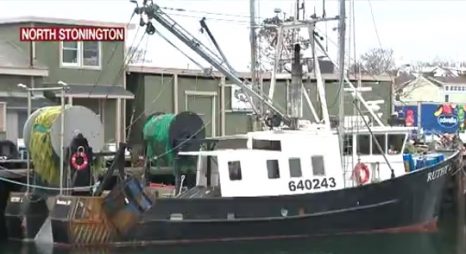
Proposed wind farms off of New London worry local fishermen
Last week, Ørsted and Eversource announced a joint venture and has submitted a bid to build Connecticut’s first offshore wind farm, in response to the state’s request for proposals for offshore wind energy generation. The approximately 200-megawatt project – Constitution Wind – would be the first of its kind to serve the state of Connecticut and would be located in federal waters 65 miles off shore. “That’s the traditional fishing ground where they’re talking about now,” said Stonington Fisherman Bob Guzzo. >click to read<18:56

2018 Mass. DMF fishing regulations go into effect April 20
The Division of Marine Fisheries (DMF) has enacted new regulations, which were informed in part by this winter’s public hearings. The regulations were reviewed and approved by the Marine Fisheries Advisory Commission at its March 15 meeting, and go into effect on April 20. The most substantive change is an adjustment to the open commercial fishing days for black sea bass. The new open commercial fishing days are Sundays, Tuesdays, and Thursdays.,, The commercial black sea bass season will begin on Tuesday, July 10.,, During the inshore small-mesh trawl squid fishery, April 23–June 9, trawlers will be allowed to retain a 50-pound bycatch limit of black sea bass. >click to read<18:00

New rule: “no discharge zone” bans vessels from releasing sewage into Puget Sound
Recreational and commercial vessels will not be able to release treated or untreated sewage into Puget Sound waters under new rules approved by the state aimed at improving water quality. The Department of Ecology on Monday officially designated a new “no discharge zone” in Puget Sound to protect shellfish beds, public beaches and sensitive marine environments from harmful bacteria. There are dozens of such zones across the country, but this is the first in the Pacific Northwest. The state estimates about 215 commercial vessels and 2,000 recreational boats >click to read<16:30
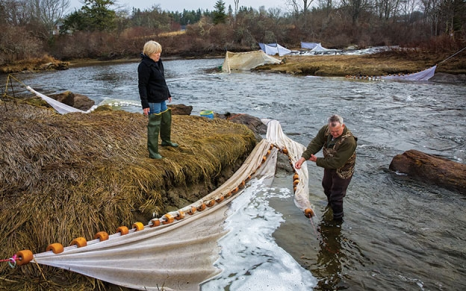
Elver run looks good, prices up over last year
Since the start of the elver season on March 22, the spring run has been picking up and landings are looking good. The Ellsworth American reported that dealers paid an average price of $2,747 per pound the first week of the harvest for elvers, which are bought by eel farmers in Asia. Elvers are by far Maine’s most valuable fishery per pound, but the catch is limited by a quota, so in terms of sales revenues it’s one of the least valuable in the state. According to the Maine Department of Marine Resources, elver landings among non-native harvesters reported as of 6 p.m. on April 7 totaled 581.7 pounds out of an overall quota of 7,566.3 pounds. >click to read<15:29

Greasing the Skids: Bay State Wind Plans More Than $2 Million in Environmental Research Grants
Bay State Wind, which is working to bring clean, renewable and affordable energy to Massachusetts, today announced plans to provide more than $2 million in grants for research and programs to protect New England’s fisheries and whale populations. The grants include $1 million for a Bay State Wind Marine Science Grant Program for directed fisheries resources research on the Bay State Wind lease area. Funded projects will focus on addressing specific questions and concerns raised by the fishing industry. In addition, the Woods Hole Oceanography Institute would receive a $500,000 multi-year grant for the development of advanced whale detection systems, and the New England Aquarium Right Whale Research Project and the Lobster Foundation of Massachusetts would each receive $250,000 to prevent gear entanglement of the North Atlantic Right Whale. >click to read<11:27

Coast Guard medevacs injured crewman from fishing vessel south of Montauk
Coast Guard crews medevaced a 25-year old man from a fishing vessel 80-miles southeast of Montauk, New York, early Tuesday morning. Watchstanders at Coast Guard Sector Long Island Sound command center received notification around 11:00 p.m., Monday from the captain of the ‘Reaper’ that a crewmember had experienced what appeared to be a seizure, and struck his head on an object when he fell. The man’s current medical condition is unknown. The ‘Reaper’ is a 45-foot fishing vessel homeported in Point Judith, Rhode Island. -USCG-10:57
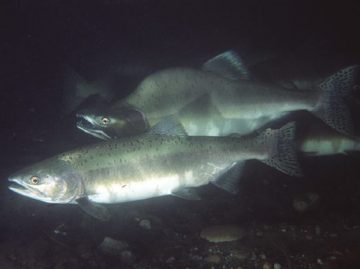
Pacific salmon ‘more abundant than ever’, new study claims
Pacific salmon are generally “more abundant than ever.” That is the provocative conclusion of a new paper published in Marine and Coastal Fisheries by Greg Ruggerone of Seattle’s Natural Resources Consultants and James Irvine of the Department of Fisheries and Oceans. The study used historical commercial catch and escapement data for the entire Pacific region for both wild and commercial hatchery salmon over a 90-year period, up to 2015. There is one caveat, however: Ruggerone and Irvine analyzed only data for pink, chum and sockeye salmon. >click to read<09:13

Trudeau government turns to senior Liberals, Indigenous on rules for MPA’s
The Trudeau government has named an advisory panel to navigate the stormy issue of what activities will and will not be allowed inside coastal waters and ocean designated as marine protected areas. Canada has promised to “protect” 10 per cent of marine waters by 2020, but what that means in terms of restrictions on fishing and other commercial activity has not been established. “We’re not there yet,” said Rémi Bujold, who co-chairs a seven-member advisory panel named Friday by the Department of Fisheries and Oceans. No one from the fishing industry is on the panel. >click to read< 07:46
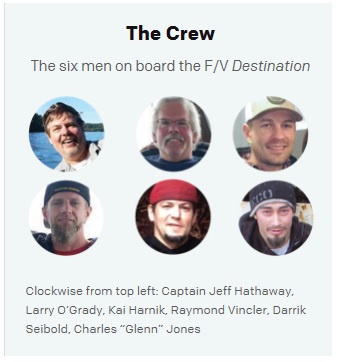
The Boat at the Bottom of the Sea
Captain William Prout was up early. Or was it late? During crabbing season it was sometimes hard to tell the difference. The day before, Friday, February 10, 2017, Prout and his crew had offloaded a batch of snow crab on the remote Bering Sea island of St. Paul. Then they’d turned the Silver Spray around and motored back out to the fishing grounds to collect their remaining crab pots. At 5am on Saturday, Prout pulled his anchor and pointed his bow southeast. Hours of darkness still remained—dawn came late on the Bering Sea in February. Captain Prout stayed in the wheelhouse, drinking coffee with his son and looking out at the icy night, as the Silver Spray churned along. >click to read<20:06
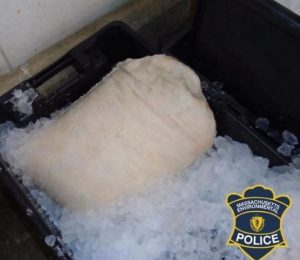
Busted! Environmental Police discover scallops hidden in bathroom, refrigerator
A commercial scallop vessel was found to be hiding scallops in the bathroom and refrigerator following an inspection on Sunday, according to the Massachusetts Environmental Police. The fishing vessel Lugia was on a “closed area trip” which restricted the landing limit to 18,000. Upon completion of the off-load, the vessel was found to be over the limit by three-hundred pounds. Environmental Police officers asked the captain if there were any more scallops on the vessel after the off-load, according to Maj. Pat Moran. >click to read<18:24
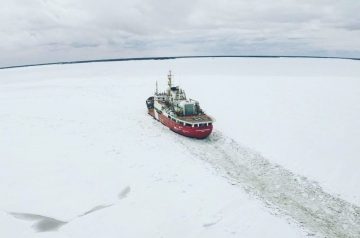
Ice, winds block early fishing season in Gulf of St. Lawrence
Thick ice and cold weather conditions are preventing an early snow crab fishing season that would help reduce potential ship strikes and whale entanglements in the Gulf of St. Lawrence. The Coast Guard’s Sir William Alexander, a light icebreaker, was called to smash through packs of ice off the northeast coast of New Brunswick to help the critically endangered North Atlantic right whales that are expected to make their way to Canadian waters later this spring. “The ice conditions are severe,” said Douglas Roe, commander of the icebreaker. >click to read<16:43
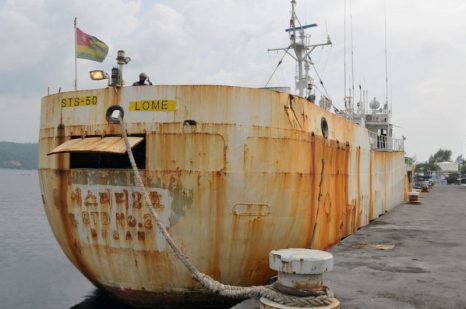
Indonesia Seizes Fugitive Fishing Boat Carrying 18 Miles of Illegal Gillnets
Indonesia, acting on a request from Interpol, has seized a fishing boat carrying 600 illegal gillnets that can stretch up to 30 km (18 miles) after it evaded capture in several countries, the Fisheries Ministry said. The vessel, the STS-50, had targeted Antarctic toothfish, the ministry said, a cod species that plays an important role in the Southern Ocean ecosystem. Officially stateless, the STS-50 evaded authorities by flying eight different flags at different times, including those of Sierra Leone, Togo, Cambodia, South Korea, Japan, Micronesia and Namibia, the ministry said in a statement on Sunday. >click to read<13:22
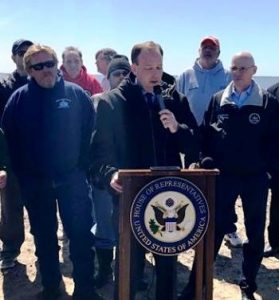
BLACK SEA BASS – THE NEW “WAR BETWEEN THE STATES”
On April 9, 1865, General Robert E. Lee surrendered to General Ulysses S. Grant at the Appomattox Court House in Virginia, signifying the end of the U.S. Civil War. One hundred and fifty-three years to the day, north and south are set to do battle yet again, this time over sea bass. From April 30 through May 3, the Atlantic States Marine Fisheries Commission (ASFMC) will hold its 2018 spring meeting in Arlington, VA, a city that was once the dividing line between Confederates to the South and the Union Army to the north during the bloodiest war in U.S. history. >click to read<12:41

State of Washington v. United States: Supreme Court to tackle salmon case without Justice Kennedy
When the full Supreme Court resumes arguments in mid-April, the Court will be short by one Justice when it considers a long-running dispute about salmon fishing, Indian treaty rights, and culverts in the state of Washington. On March 19, the Clerk of the Supreme Court clerk Scott Harris told the parties in State of Washington v. United States that a routine check missed Justice Anthony Kennedy’s participation in an earlier judicial decision from 1985, when Kennedy was on the federal circuit bench, related to the current case. After learning about the situation, the court said Justice Kennedy declined to end his participation in the current case. With eight Justices on the bench for the April 18 arguments, Washington v. United States should get its fair share of attention. >click to read<






